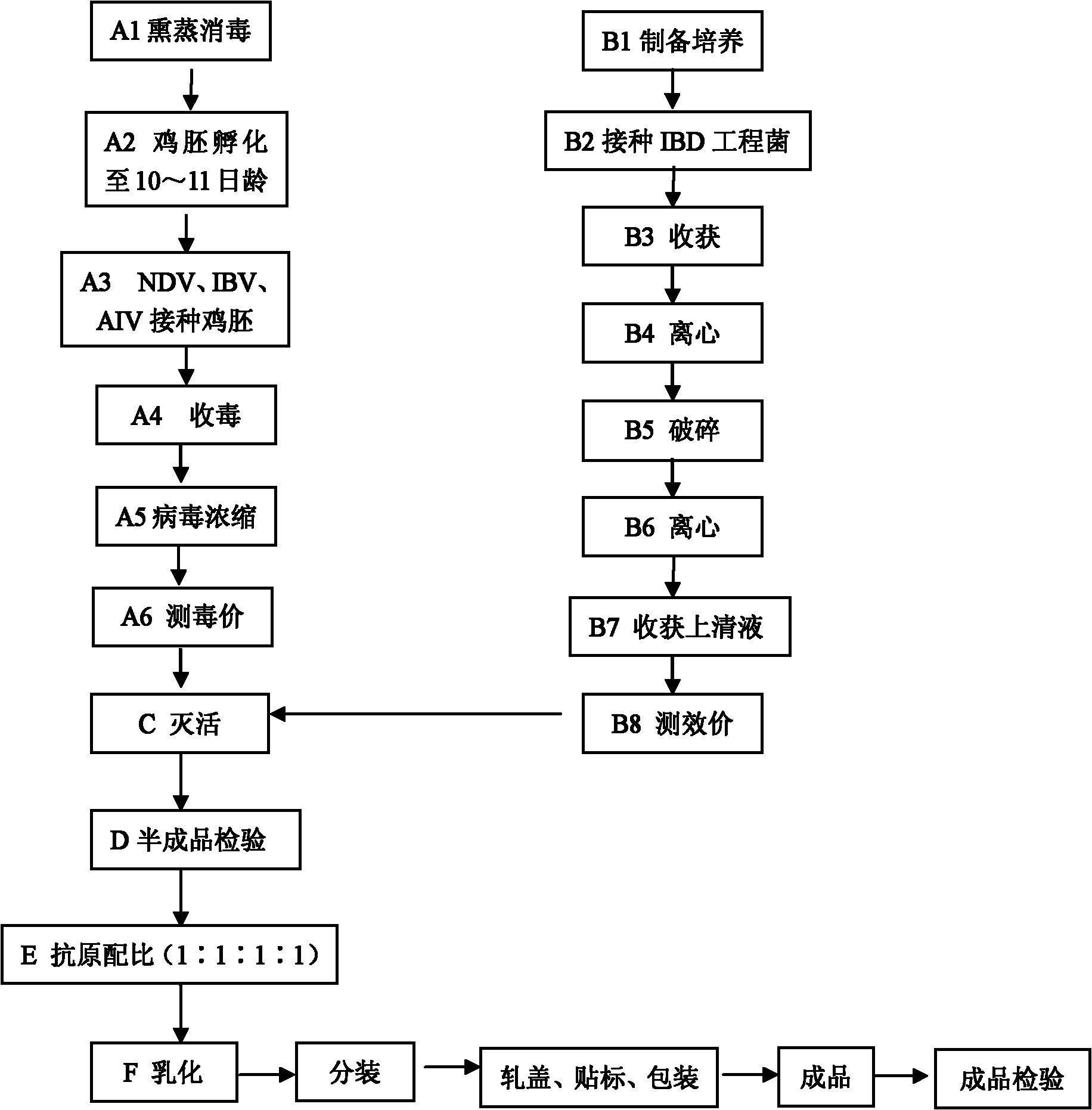Method for producing quadruple inactivated vaccine for newcastle disease, infectious bronchitis, avian influenza (H9 subtype) and infectious bursal disease
A technology for bronchitis and chicken infectivity, applied in antiviral agents, pharmaceutical formulas, virus antigen components, etc., can solve the problems of uncontrollable epidemic development, single traditional vaccine, and affecting production performance, so as to reduce the occurrence of epidemic diseases and The effect of spreading, rapid antibody production, and long protection period
- Summary
- Abstract
- Description
- Claims
- Application Information
AI Technical Summary
Problems solved by technology
Method used
Image
Examples
Embodiment 1
[0073] (1) Antigen preparation and inspection of semi-finished products:
[0074] 1. Preparation of Chicken Newcastle Disease Virus Liquid
[0075] (1) Inoculation Take the virus seeds for production and make appropriate dilution with sterilized physiological saline (such as 10 -4 or 10 -5 ), inoculate 6528 10-11-day-old susceptible chicken embryos, 0.1ml per embryo, seal the pinhole after inoculation, and continue incubation at 36-37°C without turning the embryos.
[0076] (2) Incubation and observation After chicken embryos were inoculated, the embryos were photographed once a day, and the chicken embryos that died 60 hours ago were discarded. Thereafter, the embryos were photographed once every 4-6 hours, and the dead embryos were taken out at any time until 96 hours, regardless of whether they were dead or not, all were taken out, the air chamber was upward, and they were cooled at 2-8°C for 12-24 hours.
[0077] (3) Harvesting Take out the cooled chicken embryos, and h...
Embodiment 2
[0121] Product testing
[0122] 1. traits
[0123] Appearance Milky white emulsion.
[0124] Dosage form water-in-oil type. Take a clean straw, suck a small amount of vaccine and drop it into cold water, except for the first drop, it should not spread.
[0125] Stability Take 10ml of the vaccine and put it into a centrifuge tube, centrifuge at 3000r / min for 15 minutes, the water precipitated at the bottom of the tube should be ≤0.5ml.
[0126] Viscosity Use a 1ml straw (the inner diameter of the lower mouth is 1.2mm, and the inner diameter of the upper mouth is 2.7mm) to draw 1ml of vaccine at about 25°C, let it flow out vertically and naturally, and record the time required for the outflow of 0.4ml, which should be within 6 seconds.
[0127] 2. Sterility test According to the current "Chinese Veterinary Pharmacopoeia", it should grow aseptically.
[0128] 3. Safety inspection Use 10 SPF chickens aged 7 to 14 days, inject 1ml of vaccine subcutaneously in each muscle or nec...
PUM
 Login to View More
Login to View More Abstract
Description
Claims
Application Information
 Login to View More
Login to View More - R&D
- Intellectual Property
- Life Sciences
- Materials
- Tech Scout
- Unparalleled Data Quality
- Higher Quality Content
- 60% Fewer Hallucinations
Browse by: Latest US Patents, China's latest patents, Technical Efficacy Thesaurus, Application Domain, Technology Topic, Popular Technical Reports.
© 2025 PatSnap. All rights reserved.Legal|Privacy policy|Modern Slavery Act Transparency Statement|Sitemap|About US| Contact US: help@patsnap.com

